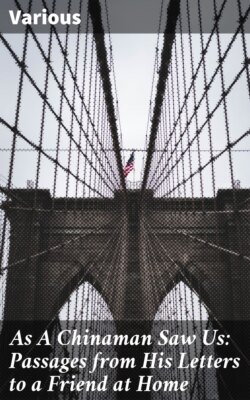Читать книгу As A Chinaman Saw Us: Passages from His Letters to a Friend at Home - Various - Страница 3
На сайте Литреса книга снята с продажи.
PREFACE
ОглавлениеTable of Contents
Since the publication in 1832 of that classic of cynicism, The Domestic Manners of the Americans, by Mrs. Trollope, perhaps nothing has appeared that is more caustic or amusing in its treatment of America and the Americans than the following passages from the letters of a cultivated and educated Chinaman. The selections have been made from a series of letters covering a decade spent in America, and were addressed to a friend in China who had seen few foreigners. The writer was graduated from a well-known college, after he had attended an English school, and later took special studies at a German university. Americans have been informed of the impressions they make on the French, English, and other people, but doubtless this is the first unreserved and weighty expression of opinion on a multiplicity of American topics by a Chinaman of cultivation and grasp of mind.
It will be difficult for the average American to conceive it possible that a cultivated Chinaman, of all persons, should have been honestly amused at our civilization; that he should have considered what Mrs. Trollope called "our great experiment" in republics a failure, and our institutions, fashions, literary methods, customs and manners, sports and pastimes as legitimate fields for wit and unrepressed jollity. Yet in the unbosoming of this cultivated "heathen" we see our fads and foibles held up as strange gods, and must confess some of them to be grotesque when seen in this yellow light.
It is doubtless true that the masses of Americans do not take the Chinaman seriously, and an interesting feature of this correspondence is the attitude of the Chinaman on this very point and his clever satire on our assumption of perfection and superiority over a nation, the habits of which have been fixed and settled for many centuries. The writer's experiences in society, his acquaintance with American women of fashion and their husbands, all ingeniously set forth, have the hall-mark of actual novelty, while his loyalty to the traditions of his country and his egotism, even after the Americanizing process had exercised its influence over him for years, add to the interest of the recital.
In revising the correspondence and rearranging it under general heads, the editor has preserved the salient features of it, with but little essential change and practically in its original shape. If the reader misses the peculiar idioms, or the pigeon-English that is usually placed in the mouth of the Chinaman of the novel or story, he or she should remember that the writer of the letters, while a "heathen Chinee," was an educated gentleman in the American sense of the term. This fact should always be kept in mind because, as the author remarks, to many Americans whom he met, it was "incomprehensible that a Chinaman can be educated, refined, and cultivated according to their own standards."
With pardonable pride he tells how, on one occasion, when a woman in New York told him she knew her ancestral line as far back as 1200 A. D., he replied that he himself had "a tree without a break for thirty-two hundred years." He was sure she did not believe him, but he found her "indeed!" delightful. The author's name has been withheld for personal reasons that will be sufficiently obvious to those who read the letters. The period during which he wrote them is embraced in the ten years from 1892 to 1902.
Henry Pearson Gratton.
San Francisco, California,
May 10th, 1904.
